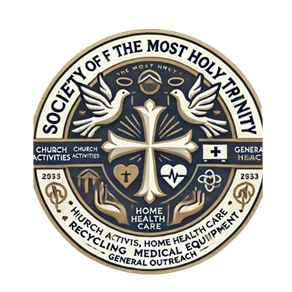Welcome to the Society of the Most Holy Trinity
Our Services and Activity
Our Services and Specific Activities
The SOCIETY OF THE MOST HOLY TRINITY provides compassionate and comprehensive medical services, dedicated to promoting health and well-being for individuals and families. Our mission is to deliver high-quality care with a focus on holistic healing, dignity, and respect for all.
Elderly Care Services
We prioritize the dignity and well-being of seniors by
- Worship Essentials: Donating Bibles, hymnals, and liturgical items to enrich spiritual practices.
- Infrastructure Development: Building and renovating worship spaces, classrooms for Sunday schools, and community centers.
Religious Outreach and Church Support
Strengthening faith communities through:
- Access to Medications: Providing essential medications and medical supplies.
- Critical Medical Equipment: Supplying ambulances, portable diagnostic tools, oxygen tanks, and more.
- Home Care Programs: Training caregivers to deliver compassionate, home-based healthcare services.
Healthcare Services for the Sick
Bringing healing and comfort through: Access to Medications: Providing essential medications and medical supplies.
Support for Individuals with Developmental Disabilities
Promoting inclusion and independence through: Technology and Tools: Donating adaptive devices, communication aids, and educational software
Mental Health and Holistic Care Programs
Advocating for mental wellness through: Therapeutic Services: Providing access to counseling, group therapy, and stress management workshops.

OUR MISSION
The Society of the Most Holy Trinity is a global Christian organisation dedicated to serving God through spiritual, educational, charitable, and health-related initiatives. Guided by our unwavering belief in the sanctity and dignity of human life, from conception to natural death, we aim to meet the fundamental needs of individuals and communities through faith-based action, education, and compassionate service. We exist to foster spiritual, physical, and social well-being, aligning with the principles of our faith, and complying with IRS standards for religious, health care, and charitable organisations.
Our Latest Events
Contribution to Our Community
SOCIETY OF THE MOST HOLY TRINITY
contact Us
Latest News
Now Accepting Medical Equipment and Accessories!
Exciting News from the Society of the Most Holy Trinity
We Are Hiring!
Frequently Asked Questions




